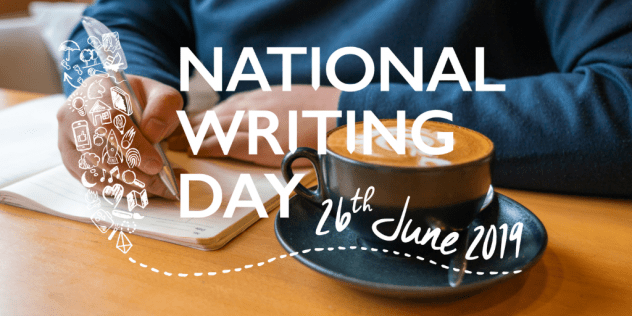By Emily Pedder
This year City’s Short Courses have partnered with National Writing Day, an initiative designed to inspire people across the UK to get writing. To celebrate we are bringing you an interview with one of our most successful alumni, the novelist Luiza Sauma.
Luiza took several short courses at City before she began her career as a novelist. Her first novel, Flesh and Bone and Water, was published in 2017 by Viking to great acclaim. Tomorrow sees the launch of her second novel, Everything You Ever Wanted. Set on a perfect parallel planet the book explores our ‘age of anxiety’. This interview was conducted by Emily Pedder, Course Director for the Novel Studio…
EP: Luiza, thank you so much for being part of this year’s National Writing Day. We’re thrilled to be involved with such an important initiative which aims to inspire creative writing from the very earliest stages.
Can I start by asking whether there was a teacher or adult who you got you interested in storytelling at a young age?
LS: Sometimes I feel like I’m the only author who didn’t have an inspiring English teacher. I loved literature, but I didn’t thrive at school. Luckily I grew up in a house full of books and my parents encouraged me to read widely from an early age. They’re both psychoanalysts, so storytelling is central to their work – psychoanalysis is all about stories.
EP: What was the first book to make you cry?
LS: Books don’t often make me cry. I think I shed a tear when the dog died in Milan Kundera’s The Unbearable Lightness of Being, which I read when I was a teenager. I found that scene unbearably tender.
EP: Who were your favourite authors as a child?
LS: Roald Dahl, Enid Blyton, Louisa May Alcott, C S Lewis, Beatrix Potter, Mark Twain and Hans Christian Andersen. Dahl in particular. I used to re-read Matilda every couple of weeks.
EP: If you could tell your younger writing self anything, what would it be?
LS: I would say, ‘Believe in yourself,’ because I wasted too many years on anxiety and self-doubt. But believing in yourself is easier said than done when you’re surrounded by critical voices. Our society is very hard on young women.
EP: What is it about writing that motivates or inspires you?
LS: Sometimes it feels involuntary – I write in my head all the time. Both reading and writing are a comfort to me; they help me to understand the world.
EP: You recently became a mum. How has that experience affected your writing?
LS: I’m not able to write at the moment – my baby occupies all of my time. But I’m still writing in my head, like always. I’m very sleep-deprived, but the ideas are percolating. Motherhood has been so challenging, intense and joyful. I feel utterly changed. I’ve never had so many ideas.
EP: Your latest novel is a dystopian take on the modern world. What prompted you to set it in an imagined future?
LS: Everything You Ever Wanted is set in the near future – a world that everyone would recognise, apart from the fact that people are being sent to live on another planet. When I came up with the idea, I was writing my first novel, working full-time in an office and feeling quite trapped. This was before Brexit, before Donald Trump became president, but there was a sense of increasing anger and anxiety in the world, and social media seemed to be making it worse. I knew I wanted to explore these things.
Then I heard an episode of the podcast Love + Radio about a woman who wanted to take part in the Mars One mission – which would involve leaving Earth, never to return – and suddenly there was my idea. A lot of people have been joking, lately, about leaving Earth, because things are so awful right now – but what would it take to actually do it? I was feeling stuck, so I thought I might as well try and write something completely wild. At the very least, I thought it would be fun.
EP: Do you see your novels as completely separate or is there a thread that links them for you?
LS: One of the things that excited me about Everything You Ever Wanted was that it felt completely different to my first novel, which was deeply rooted in Brazilian culture, the immigrant experience and the real world. But when I finished writing it, I realised I had written another novel about immigration – just on a larger, cosmic scale. I was born in Brazil and I come from a long line of immigrants from various countries. It’s the defining story of my family, and quite hard to shake off.
EP: Finally, if your daughter grows up and says she wants to be a writer, what would your advice be?!
LS: I would tell her to find a day job that doesn’t eat up all her time and energy, to be ambitious in her work, but also to look after herself – both mentally and physically. Writing is an unstable career, so it’s important to find stability elsewhere.
EP: Thank you so much for taking the time to do this, Luiza, and so much luck with the next novel!
Everything You Ever Wanted is published by Viking on 27th June 2019.
For more about the short courses Luiza took at City, visit our short course writing home page.




Recent Comments